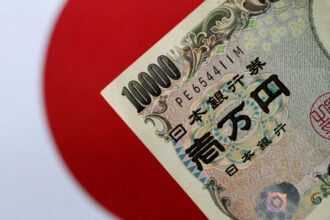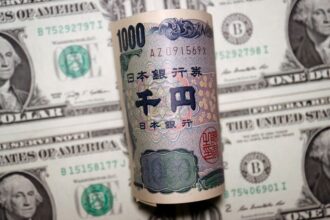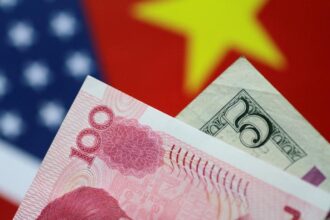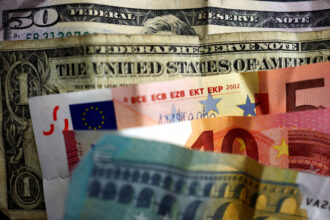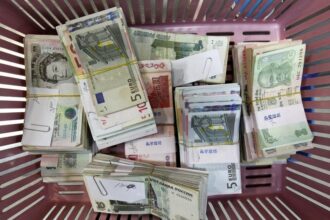By Tetsushi Kajimoto
TOKYO (Reuters) -Japan is not ruling out any options in responding appropriately to excessive currency moves, its top currency diplomat said on Monday, stepping up warnings against recent yen weakening that was “rapid and one-sided”.
Currencies should move in a stable way, reflecting fundamentals, the government said, after the yen weakened beyond 143 yen on Friday, a seven-month low versus the dollar, and fell to a 15-year low beyond 155 yen to the euro.
The currency, often perceived as a safe-haven asset, is coming under renewed selling pressure, threatening consumers with an import cost spike.
“We have all options available and we are not ruling out any,” Vice Finance Minister for International Affairs Masato Kanda told reporters when asked whether authorities stood ready to intervene in the market.
“I won’t comment on what to do now.”
A monetary policy divergence between the Bank of Japan (BOJ) and the U.S. Federal Reserve was seen as driving up the dollar, as Japan continues easing while the U.S. central bank has tightened policy aggressively to fight inflation.
The government was closely monitoring the currency market, its top spokesperson said.
“It’s important for the currency market to move stably reflecting fundamentals,” Chief Cabinet Secretary Hirokazu Matsuno told reporters. “The government will closely watch the currency market with a strong sense of urgency and respond appropriately to excessive moves.”
Japan last conducted rare yen-buying intervention in October to stem weakening after it plunged to a 32-year low of near 152 yen to the dollar.
“The dollar was trading around 145 yen when Japanese authorities intervened last September, so market players put a threshold beyond 145 yen as a red zone,” said Daisaku Ueno, chief FX strategist at Mitsubishi UFJ (NYSE:) Morgan Stanley (NYSE:) Securities.
“Chances of intervention will grow if authorities escalate warnings to say things like they are ‘deeply concerned’ and/or ‘ready to take decisive action’.”
Kanda, asked about the chances of intervention, said he would not rule any option out.
“Regardless of the direction, it’s generally not good for Japan’s economy and global economy if exchange rates move excessively in a way that deviates from economic fundamentals,” Kanda said.
“Underlying moves are rapid and one-sided.”
Authorities were focusing on the pace of moves in the yen, rather than its levels, he said.
Investors have been selling yen after the BOJ kept interest rates ultra-low at a two-day policy review ending on June 16, when it vowed to maintain its stimulus, in contrast with other central banks tightening policy to ease stubborn inflation.
Read the full article here





